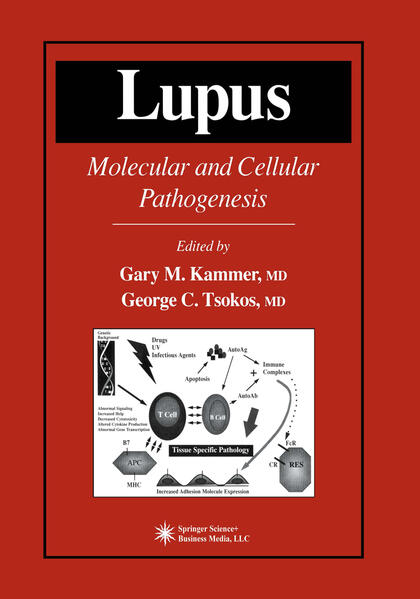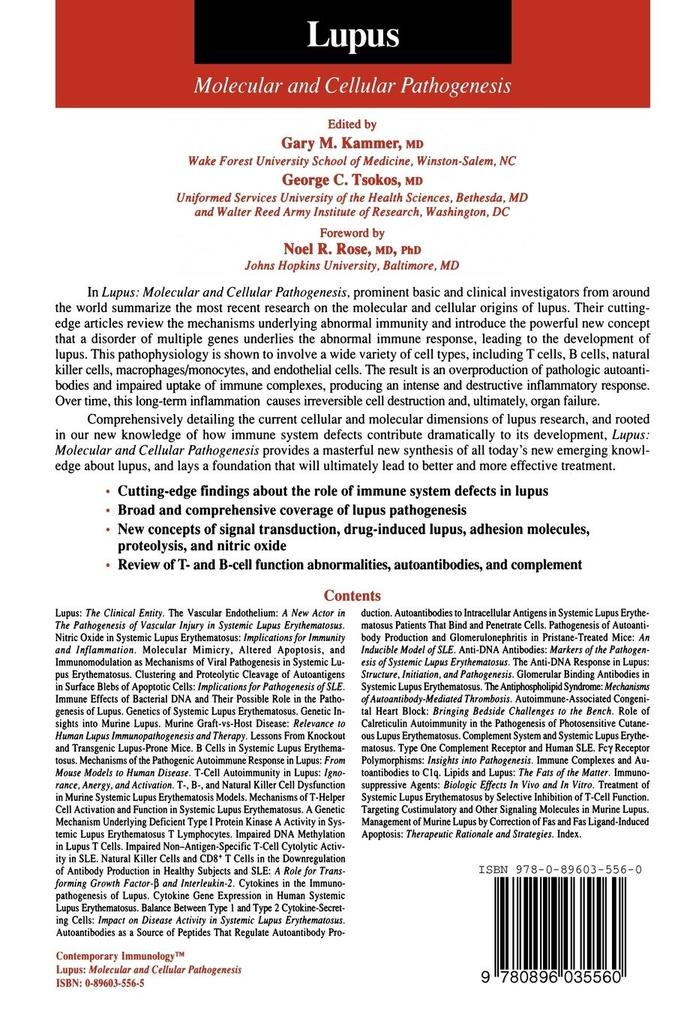Leading basic and clinical investigators from around the world summarize the most recent research on the molecular and cellular origins of lupus. Their cutting-edge articles review the mechanisms underlying abnormal immunity and introduce the powerful new concept that a disorder of multiple genes underlies the abnormal immune response, leading directly to the development of lupus. This pathophysiology is shown to involve a wide variety of cell types, including T cells, B cells, natural killer cells, macrophages/monocytes, and endothelial cells. Over time, the resulting long-term inflammation causes irreversible cell destruction and, ultimately, organ failure. Lupus: Molecular and Cellular Pathogenesis is a masterful new synthesis of all the new knowledge emerging today about lupus. Its new perspectives will sharpen the focus of research and ultimately lead to better and more effective treatment.
Inhaltsverzeichnis
1 Lupus: The Clinical Entity. - 2 The Vascular Endothelium: A New Actor in The Pathogenesis of Vascular Injury in Systemic Lupus Erythematosus. - 3 Nitric Oxide in Systemic Lupus Erythematosus: Implications for Immunity and Inflammation. - 4 Molecular Mimicry, Altered Apoptosis, and Immunomodulation as Mechanisms of Viral Pathogenesis in Systemic Lupus Erythematosus. - 5 Clustering and Proteolytic Cleavage of Autoantigens in Surface Blebs of Apoptotic Cells: Implications for Pathogenesis of SLE. - 6 Immune Effects of Bacterial DNA and Their Possible Role in the Pathogenesis of Lupus. - 7 Genetics of Systemic Lupus Erythematosus. - 8 Genetic Insights into Murine Lupus. - 9 Murine Graft-vs-Host Disease: Relevance to Human Lupus Immunopathogenesis and Therapy. - 10 Lessons From Knockout and Transgenic Lupus-Prone Mice. - 11 B Cells in Systemic Lupus Erythematosus. - 12 Mechanisms of the Pathogenic Autoimmune Response in Lupus: From Mouse Models to Human Disease. - 13 T-Cell Autoimmunity in Lupus: Ignorance, Anergy, and Activation. - 14 T-, B-, and Natural Killer Cell Dysfunction in Murine Systemic Lupus Erythematosis Models. - 15 Mechanisms of T Helper Cell Activation and Function in Systemic Lupus Erythematosus. - 16 A Genetic Mechanism Underlying Deficient Type I Protein Kinase A Activity in Systemic Lupus Erythematosus T Lymphocytes. - 17 Impaired DNA Methylation in Lupus T Cells. - 18 Impaired Non Antigen-Specific T-Cell Cytolytic Activity in SLE. - 19 Natural Killer Cells and CD8+ T Cells in the Downregulation of Antibody Production in Healthy Subjects and SLE: A Role for Transforming Growth Factor-? and Interleukin-2. - 20 Cytokines in the Immunopathogenesis of Lupus. . - 21 Cytokine Gene Expression in Human Systemic Lupus Erythematosus. - 22 Balance Between Type 1 and Type 2Cytokine-Secreting Cells: Impact on Disease Activity in Systemic Lupus Erythematosus. - 23 Autoantibodies as a Source of Peptides That Regulate Autoantibody Production. - 24 Autoantibodies to Intracellular Antigens in Systemic Lupus Erythematosus Patients That Bind and Penetrate Cells. - 25 Pathogenesis of Autoantibody Production and Glomerulonephritis in Pristane-Treated Mice: An Inducible Model of SLE. - 26 Anti-DNA Antibodies: Markers of the Pathogenesis of Systemic Lupus Erythematosus. - 27 The Anti-DNA Response in Lupus: Structure, Initiation, and Pathogenesis. - 28 Glomerular Binding Antibodies in Systemic Lupus Erythematosus. - 29 The Antiphospholipid Syndrome: Mechanisms of Autoantibody-Mediated Thrombosis. - 30 Autoimmune-Associated Congenital Heart Block: Bringing Bedside Challenges to the Bench. - 31 Role of Calreticulin Autoimmunity in the Pathogenesis of Photosensitive Cutaneous Lupus Erythematosus. - 32 Complement System and Systemic Lupus Erythematosus. - 33 Type One Complement Receptor and Human SLE. - 34 Fc? Receptor Polymorphisms: Insights into Pathogenesis. - 35 Immune Complexes and Autoantibodies to C1q. - 36 Lipids and Lupus: The Fats of the Matter. - 37 Immunosuppressive Agents: Biologic Effects In Vivo and In Vitro. - 38 Treatment of Systemic Lupus Erythematosus by Selective Inhibition of T-Cell Function. - 39 Targeting Costimulatory and Other Signaling Molecules in Murine Lupus. - 40 Management of Murine Lupus by Correction of Fas and Fas Ligand Induced Apoptosis: Therapeutic Rationale and Strategies.













